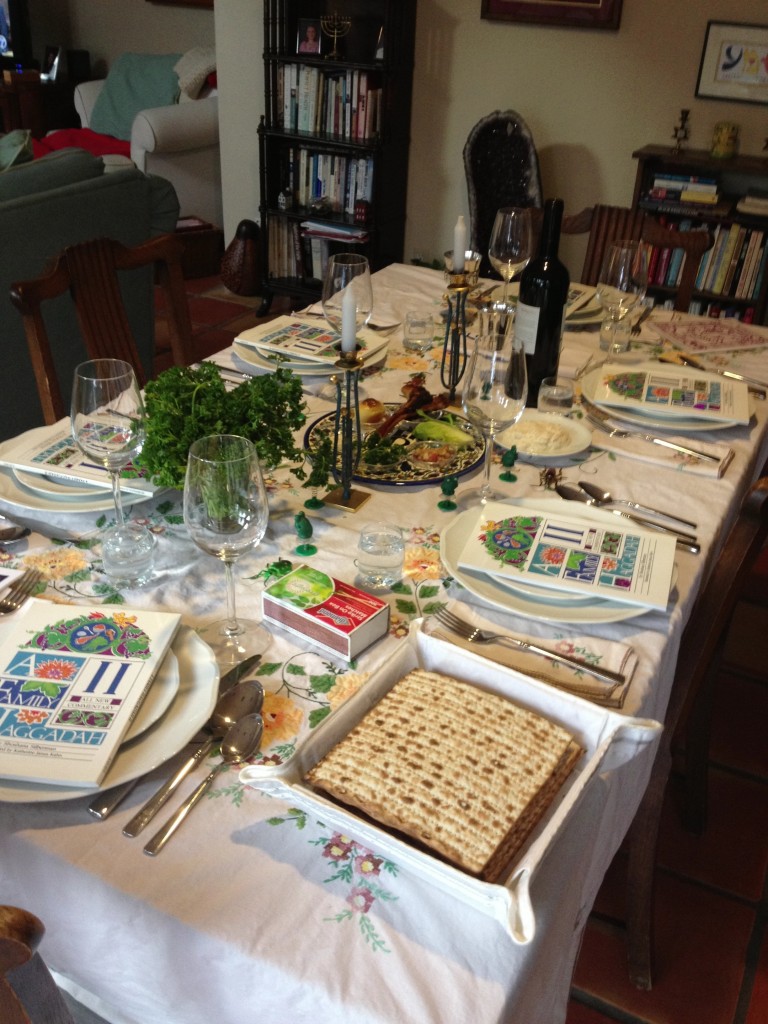 I’ve started making plans for my Passover seder. As I do, I sense myself contracting, feeling enslaved, as I think about the preparations I need to make for this Jewish holiday, which happens to celebrate freedom. Yet, many women feel enslaved by housework and cooking all year long. They could feel liberated instead.
I’ve started making plans for my Passover seder. As I do, I sense myself contracting, feeling enslaved, as I think about the preparations I need to make for this Jewish holiday, which happens to celebrate freedom. Yet, many women feel enslaved by housework and cooking all year long. They could feel liberated instead.
Despite the egalitarian nature of many homes, the jobs of cleaning the house, making the kitchen kosher for Passover (fit for use according to Jewish dietary or ceremonial laws), removing all leavened products – down to the last crumb found in the corner of an upstairs bedroom, and cooking for numerous seder (the ritual Passover meal) guests most often fall on the lady of the house. Thus, on top of all their other daily household duties, childcare responsibilities and professional work outside the home, we take on the huge job of preparing for this yearly holiday that marks the Biblical story of the Israelite’s escape from Egyptian slavery. (If you aren’t Jewish, you may feel this way about Easter or Christmas.) It’s not surprising, therefore, that many a good Jewish woman has complained that Passover preparations feel like living in Mitzraim, the Hebrew word for Egypt that means “narrow place.”
However, with a change in perspective any woman who feels enslaved by household chores can move out of Mitzraim and see themselves not as slaves to the sponge, mop, vacuum, and stove but as priestess free to create sacred space, to preside over both temple and altar, and to invoke the Divine Feminine Presence into their midst. Seen in this light, Passover (or time you prepare for a secular or religious holiday) becomes an opportunity for women to exercise a religious leadership role and to transform what might be empty preparations into meaning-full and spirit-full rituals and practices.
Become a Priestess
Preparing the home for Passover or for any holiday (no matter you religion) represents a symbolic act that mimics the role of the priests in the ancient Temple in Jerusalem. If you can see your cleaning as a means by which you create sacred space for the holiday, your family, your guests, and the Shechinah (the Divine Feminine Presence), you will approach these duties with a different attitude completely. In fact, women serve as priestesses in the home at all times but especially on holidays. Since the destruction of the Temple, the home has become a mikdash ma’at, a small temple, and the dinner table a misbeach, or altar. Women are the kohanot, or priestesses, that take care of the mikdash ma’at and create the stage, the bimah, on which ritual events occur in the home.
Become an Alchemist
When it comes to cooking, on Passover—or anytime —women are alchemists as well. To the Kabbalists, or Jewish mystics, eating represents a clarification process in which our bodies extract the good from the waste and integrate it into our system to create or primi, or inner light. The digested food becomes blood, the medium through which ruach hachayim, the spirit of life or life force, passes. So, when you offer food of any type, but especially a beautiful, thoughtfully and lovingly prepared meal, to your family and friends, you help those individuals develop their inner light and bring more life spirit into their experience. You turn simple food into light or life force.
Traditionally, Jewish women have blessed the food they prepare, making the meal a holy offering in and of itself. Preparing the Passover meal and ritual foods—as well as any foods for any meal—with great intention and while blessing your culinary creations helps you transform you cooking into a spiritual practice.
Treat Every Day as a Holiday
If you lead a seder, see this home-based service not just as a chore or job for which you must prepare but as an opportunity to preside as a priestess over the ritual meal. In fact, do just that every time you serve a meal…preside over it as the priestess and make it a ritual meal even if it is not a holiday. Seeing yourself as a priestesses who creates and presides over the sanctuary of your home, the altar of your table, and the rituals of the seder or any type of holiday or meal, gives you a wonderful opportunity to be a ritual leader in your homes. Light candles and say blessing even if it isn’t a holiday. (Jews do this on holidays.) Remember you are invoking the Divine when you do so. By approaching your “duties” in this way, you make Passover rituals and observances meaningful and spiritual not only for yourself but for all those in attendance. And if you extend this attitude out to your daily household chores, your home becomes a sacred space that welcomes the Divine and feeds the soul and life spirit of all who live there.
I know seeing meal preparation and housecleaning in this light changes my attitude about it. Could you see yourself as a priestess (or priest) in your home? Leave me a comment below.


